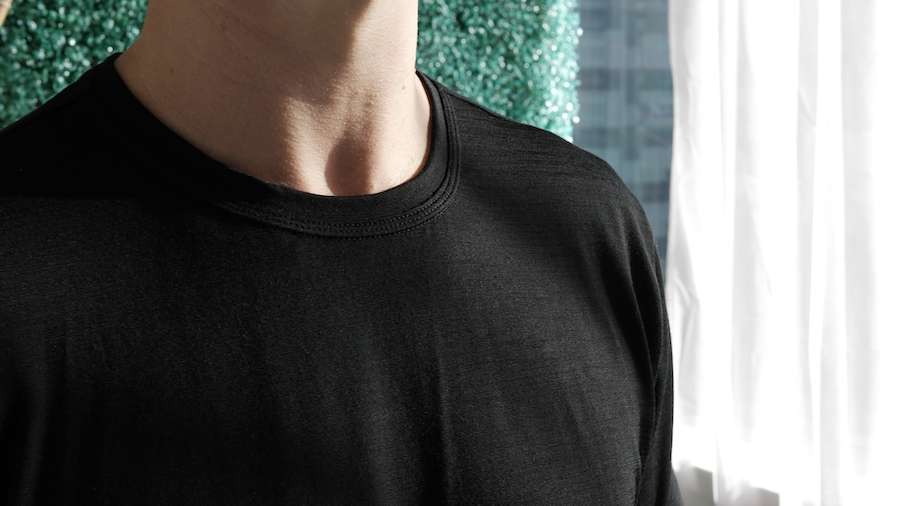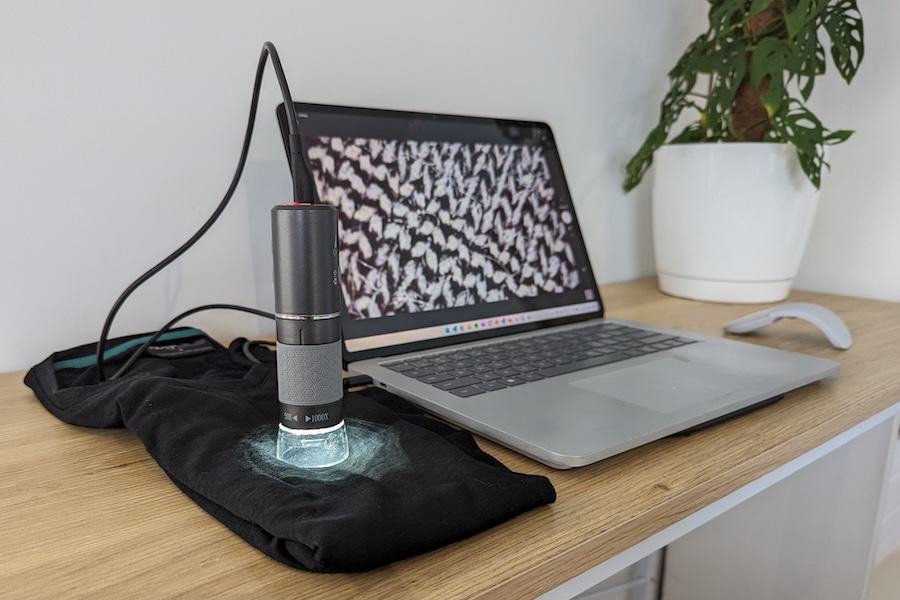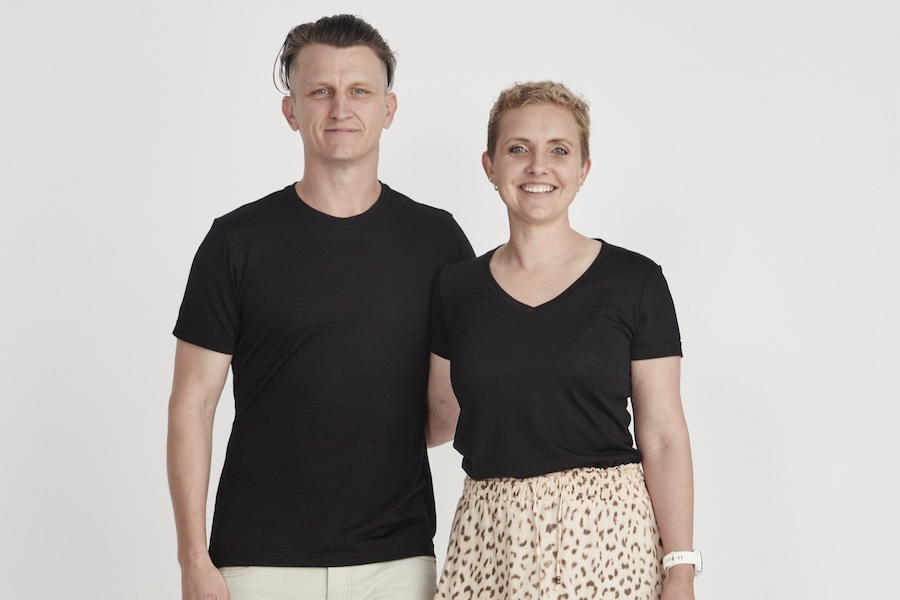Pictured above: Chris and Saphire Lorigan.
Smart Merino’s Chris Lorigan chose crowdfunding to launch natclo, his latest business venture, and found the experience perfect for validating product and building an audience.
It has been over a decade since Chris Lorigan decided to take a break from his corporate career and travel the world. During that journey he identified an opportunity to create Smart Merino – an e-commerce business that showcases New Zealand-made products to a global audience.
Despite one serious setback, when an arson attack at one of his European 3PL providers destroyed a third of his stock, Smart Merino has managed to demonstrate consistent growth without the need for any capital raising.
The simple secret, recalls Chris, was starting out small and building the brand bit by bit – “one sale at a time”.
Now in 2024 Smart Merino is still successfully growing, and his next venture is just out of the starting blocks – this time thanks to the power of crowdfunding.
This new brand, natclo (short for ‘natural clothing’), aims to create high-quality, low-maintenance clothing that is better for the planet and aligns with peoples’ values worldwide.
“We wanted a single, recognisable brand that could introduce additional natural fibres into our products, offering unique benefits when combined with merino,” explains Chris.
He’s keeping the bulk of the manufacturing process local, to give as much back to the community as possible.
The goal with natclo is to leverage off the Pareto Principle (where people wear 20 percent of their clothes 80 percent of the time). The brand cleverly focuses on ultra-versatile clothing that can be worn almost anywhere. It all starts with ‘That One Tee’ – a simple, versatile, authentic, high-quality merino T-shirt.
You can have any colour provided it’s black – other colours will be introduced later.

Why opt for crowdfunding?
“We chose crowdfunding to validate our natclo product and build an audience,” says Chris. “Crowdfunding allows us to connect with people who are passionate about industry-changing ideas. And when you’re building your brand with the community it’s a much easier transition for people to say ‘hey, I’ve been involved in this, and I feel like I’m part of it’.”
While merino is a staple of many Kiwi wardrobes, Chris says their merino-bamboo (merboo) product is still gaining recognition globally. “Kickstarter provided us with a platform to reach early adopters. It accelerated brand awareness by at least 18 months and created a feedback loop with customers who love our products.”
What Chris particularly likes about crowdfunding is its ability to let them build production to order and demand. “Provided we had broken through our fundraising target, we were allowed to begin the production process.
“Then as more people get onboard and we sell through the planned stock or fibres we have, we can then make more options available for people to buy, as production ramps up.”
The key is to keep the communication happening and remind people that they’re investing in the brand long-term.
So, was this his first experience at crowdfunding?
“Yes and no,” says Chris. “Years ago, I attempted to launch a product via crowdfunding while working for another company. However, despite strong support the project was halted due to fears of public failure.”
Fast forward to 2024, and natclo’s launch of ‘That One Tee’ couldn’t have utilised a better, or simpler, fundraising platform than crowdfunding, he says. “It connects us with a network of people who care about new products and making positive impacts on the planet, as well as the people who make their clothes.”
If you’re planning to launch a crowdfunding project here are four tips from Chris:
- Bring a fan base. “You can’t expect people to find your product from day one. Bring in supporters to help kickstart the project.”
- Know your strengths and bring in others who can complement them.
- Block out the noise. Many people will offer their services but taking them all up can lead to financial strain.
- Back yourself. If you’ve done your due diligence and see an opportunity, go for it. Platforms like Kickstarter allow you to learn and try again if needed.
Chris says he is happy to respond to any questions via LinkedIn about crowdfunding.
“The big questions to ask will always be: Is the product or service something you would buy personally? Do you see your contacts, friends or family buying or recommending it?
He says they chose different friends and contacts to trial the T-shirt and/or get their feedback, as well as help be passive influencers on what they were doing around brand creation.
Adjusting for the times
Economic times may have been tough recently, but Smart Merino has been enjoying robust growth in New Zealand this season. Chris reports that overseas, particularly in Europe, there’s been year-on-year growth, although not at the same pace as previous years.
“This slowdown is largely due to increased competition, with some competitors buying market share while offering substandard products. Unfortunately, these competitors often resort to fake reviews and misleading branding, sometimes falsely affiliating with other countries,” explains Chris. “Despite these challenges, we remain committed to telling our authentic story and maintaining our integrity.”
Like many businesses, Smart Merino has had to find efficiencies to avoid price increases and maintain quality. Chris says he has also become more mindful of customer acquisition costs and their long-term implications.
“While the initial purchase may not always be the most profitable for us, our focus on quality and service often results in repeat customers and referrals,” he says.
Chris believes their strong customer base and more than 800 reviews on Smartmerino.co.nz helped set them up for continued success.
“We’ve also seen growth in orders from businesses, often starting with individual purchases that lead to larger orders.”
For natclo, the Kickstarter launch aimed to set a realistic goal and offer competitive pricing. “Even after the campaign ‘That One Tee’ will be up to $100 more affordable each, and more versatile than its competitors,” says Chris.
“This product has been four years in the making and launching it under a new brand allows us to reset and build a new audience, addressing a fresh niche.”

Sustainability and ethics rule
There are a growing number of consumers who care about the materials and manufacturing processes behind their clothes. For the natclo launch on Kickstarter, Chris says they conducted a survey on Meta (Facebook) asking, ‘Does sustainability matter when it comes to choosing the clothing you wear?’
Unsurprisingly, 93 percent of respondents prioritised sustainability in their clothing choices*.
“While sustainability and ethically-made products do come at a premium, we’ve managed to keep prices appealing to a wide audience,” says Chris. “This balance of quality and affordability makes for slow fashion and wardrobe staples accessible to the masses.”
One challenge encountered by Smart Merino has been the perceived additional carbon footprint from shipping products globally. To address this, the company works with third parties to invest in carbon offset projects, ensuring each shipment is either carbon neutral or carbon negative, both in New Zealand and overseas.
Planning for the long term
The five-year plan is to separate the smart Merino and natclo brand further, and to eventually separate the two entities. Chris says they’re aiming to expand their Smart Merino retail brand by offering a range of New Zealand-made products and introducing new brands that appeal to their existing target market.
For natclo the plan is to develop unique products with their own identity – expanding way beyond the original ‘That One Tee’ and appealing to a new audience likely unfamiliar with merino and natural fibres.
“We’ll remain agile, listening to our customers and building products based on their needs,” explains Chris. “We’ll also explore new fibres to address additional use cases and markets.”
*Survey conducted across NZ, AU, US, CA, and UK between June 30th and July 18th via Meta’s Instant Forms, with 518 respondents.
Lessons on NZ Made
Credit for Smart Merino’s success in the markets can also be attributed to its partnership with NZ Made, which Chris says provides trust and confidence in the quality of their products.
“One of the biggest benefits is the local quality assurance, which eliminates cultural and language barriers when opting for offshore production.”
However, it hasn’t been without its challenges, he says. “Several years ago, one of New Zealand’s last dyehouses closed its doors. Dyeing is a crucial part of the process that we wanted to keep onshore.”
Fortunately, Smart Merino along with several other investors, stepped in to address the gap. Today, Kakano Innovations now dyes fabric in New Zealand for Smart Merino and other NZ Made brands.
This article was originally published in the September 2024 issue of NZBusiness magazine. To read the issue, click here.







